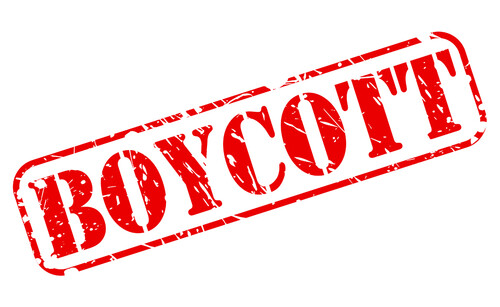How to republish
Read the original article in french and consult terms of republication.
World Cup in Qatar, Shell, Danone and Nike: questions raised by boycotts
By Hélène Ducourant, Laboratoire Territoires Techniques et Sociétés (LATTS), Université Gustave Eiffel, CNRS, École des Ponts ParisTech
In recent months, the idea of a boycott of the World Cup in Qatar has been gaining ground. In France, several mayors recently announced that their town would not broadcast the event on giant screens as usual. A number of well-known figures have announced that they will not attend or follow the event. Every day, journalists are encouraging sportsmen and politicians to take a stand. In bars, fans discuss whether to forgo the pleasure (or not) of watching exciting matches.
In the publication Sociologie de la consommation, Ana Perrin-Heredia and Hélène Ducourant trace the many links between consumption and politics.
Boycotts are one of the possible links.

Photo credit Epictura (58317129 Pockygallery)
A term born in 19th-century Ireland
In the Irish countryside of the late 19th century, Charles C. Boycott, a land agent for a wealthy landowner, demanded the payment of exorbitant rents from the tenant farmers and labourers on his land. His actions led to the eviction of tenants, who were already struggling after the famine.
In response, an Irish nationalist leader encouraged the families concerned and, more generally, all the inhabitants of the land (tradesmen, employees, etc.) to ostracise C. C. Boycott, i.e. refuse all daily contact with him. The proposition was then extended to all landlords who raised their rent and to peasants who took over land from which others had been evicted. A journalist at the time coined the word “boycott”, transforming the family name into a common noun, to refer to this action.
Although today, the term is most often associated with the refusal to maintain commercial relations with a company, not all boycotts concern commercial products. For example, 1936 saw a major campaign to boycott the Berlin Olympics in several countries in response to the Nazi regime's rise to power.
More recently, at the request of Palestinian intellectuals and academics, a boycott campaign called “Boycott, Divestment and Sanctions” (BDS) was launched. Since 2005, it has called for an economic, academic, cultural and political boycott of the Israeli State to protest against the colonisation and occupation of Palestinian land..
Today, it is the football World Cup in Qatar that is the subject of a call to boycott. Numerous reasons are cited, including environmental and social ones (such as the number of workers exploited and who lost their lives during the construction of the stadiums).
From Rosa Parks to Danone
The boycott of transport services by the Montgomery bus company (Alabama) in 1955 is one of the most famous boycotts in history.
One December evening, an Afro-American seamstress named Rosa Parks sat at the front of a bus on a seat reserved for "white" passengers. She was subsequently imprisoned for “public order offences”, which sparked a movement that lasted for over a year.
Encouraged by an association founded by a pastor, Martin Luther King, racialised passengers stopped using the company's services. Other passengers did not use them either, either out of solidarity or fear. Many private vehicles began to serve as taxis and the protesters stood their ground. Thirteen months later, the Supreme Court ruled that bus segregation was contrary to the US Constitution. In this case, the boycott of a road transport service was an important step in the development of a wider political movement, that of the American Civil Right Movement. This shows how protesting through consumption can contribute to furthering causes beyond those concerning the initial service boycotted.
In 1995, the NGO Greenpeace launched an international boycott of the Anglo-Dutch oil company Shell in response to the company’s intention to sink a North Sea offshore oil platform with several thousand tonnes of oil on board. While activists in Britain struggled to make their voices heard, German members of the association took a different approach, including a boycott of Shell service stations. In Germany, the success of the boycott was such that Shell decided to bring its platform to dry land to dismantle it. Once again, the boycott of a consumer product (in this case fuel), beyond national borders, allowed activists to sway economic forces and led to the success of environmental demands.
In the 2000s, the French company Danone decided to close various biscuit factories, which it deemed to be less profitable than its other activities and thus impacting its stock market value. When the factory closures were announced, unions and workers launched various forms of action, including a call to boycott, which was largely relayed and supported by several political figures.
In spite of the media success of the movement, Danone did not yield. Although the demands of the consumer movement were not successful this time, the boycott contributed to durably tarnishing the company’s brand image and helped strengthen the legitimacy of the fight against “stock market redundancies”, a struggle that has since gained legitimacy in the French political debate.
Collective and well-informed choices
What lessons can be learned from these boycotts? For researchers Ingrid Nyström and Patricia Vendramin, the most striking aspect is the diversity of the actors involved: trade unions, politicians, NGOs, legal experts, state representatives and “ordinary” citizens.
In addition, (non)consumption practices must not be attributed to individual consumer choices alone. Moreover, these movements must not be labelled as “new” or “alternative”. In many cases, they draw on a range of traditional practices (scandalisation, media coverage, legal action, etc.) and political institutions (politicians, established associations, etc.).
It is also important not to reduce the success or failure of a boycott to the ultimate outcome and response to a specific demand. Remember, the Danone boycott contributed to the legitimisation of political action against “stock market redundancies” in general and helped develop the idea that profits made by shareholders of multinationals, while employees suffer from crises, are illegitimate.
Lastly, boycotts must not be too hastily associated with progressive and/or environmental causes, as shown by the 2018 Nike boycott by many American consumers who were outraged by the brand’s choice of Afro-American footballer Colin Kaepernick as their brand icon after he was the first to kneel during the national anthem in support of the fight against police violence and discrimination against Afro-Americans.
An unevenly distributed form of protest
However, while consumer actions are an authentic mode of political action, examples of this approach are unevenly distributed.
Statistically, the use of boycotts in Europe is much more frequent in the north of the continent, slightly less in the west and much less in the south and the east.
Similarly and unsurprisingly, this type of movement is more common among more highly educated, middle-class activists in the tertiary sector.
But there are notable exceptions, such as in South Africa against apartheid or in India against British colonialism. Boycotts are also increasingly common in countries of the “Global South”. In Morocco, for example, the 2018 movements “against the high cost of living” targeting Sidi Ali mineral water, Centrale Danone milk and Afriquia petrol stations were particularly extensive.
But let us return to the calls to boycott the forthcoming football World Cup. Although no nations have refused to send their national team, it is important not to conclude that the protest movement has failed.
There will be multiple forms of boycott (refusing to follow it, not travelling to see matches, not watching matches, not buying merchandise such as t-shirts of the national teams, etc.), while certain arguments for the call to boycott will also gain ground. The movement will probably gain legitimacy over time... this boycott is just a single step.
DUCOURANT Hélène, PERRIN-HEREDIA Ana, Sociologie de la consommation. Armand Colin, « Cursus », 2019, ISBN : 9782200616274.
Identity card of the article
| Original title: | Coupe du monde au Qatar, Shell, Danone ou Nike : les questions que soulèvent les boycotts |
| Authors: | Hélène Ducourant |
| Publisher: | The Conversation France |
| Collection: | The Conversation France |
| License: | The original version of the article was published in French by The Conversation France under Creative Commons license. Read the original article. An English version was created by Hancock & Hutton for Université Gustave Eiffel and was published by Reflexscience under the same license. |
| Date: | March 27, 2023 |
| Languages: | English, french and spanish. |
| Keywords: | Companies, sport, consumption, football, sociology, protest, Qatar, boycott, sponsors, world Cup |

![[Translate to English:] Licence creative commons BY-SA 4.0 [Translate to English:] Licence creative commons BY-SA 4.0](https://reflexscience.univ-gustave-eiffel.fr/fileadmin/ReflexScience/Accueil/Logos/CCbySA.png)